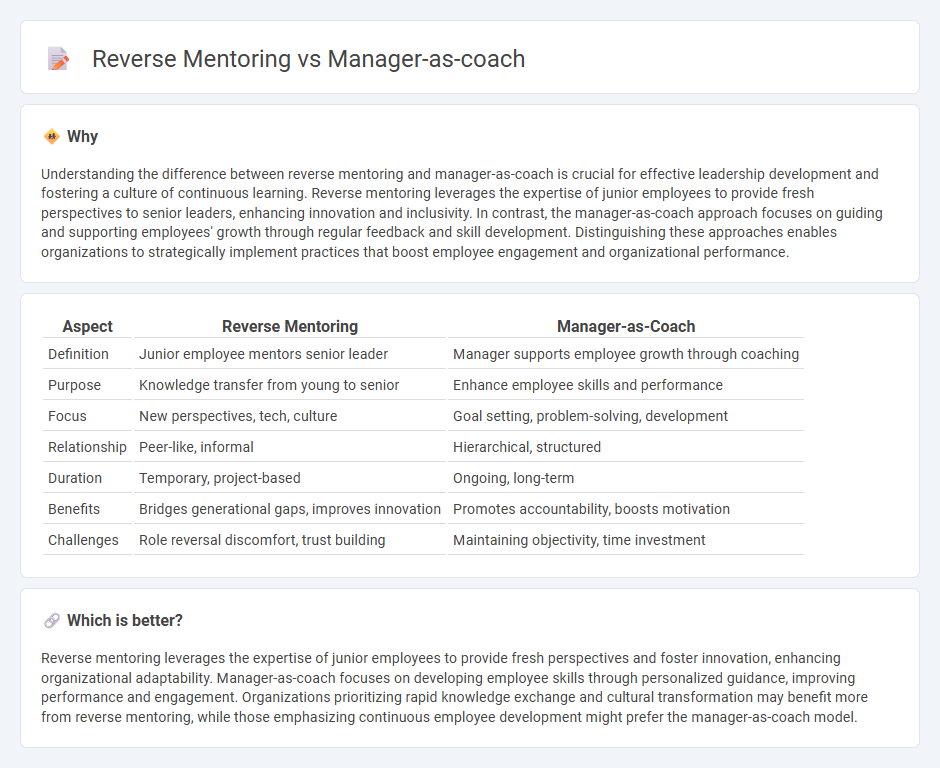
Reverse mentoring fosters knowledge exchange by pairing junior employees with senior leaders to share fresh perspectives and digital expertise. Manager-as-coach emphasizes guiding teams through active listening, feedback, and development to enhance performance and engagement. Explore these transformative leadership approaches to elevate organizational growth.
Why it is important
Understanding the difference between reverse mentoring and manager-as-coach is crucial for effective leadership development and fostering a culture of continuous learning. Reverse mentoring leverages the expertise of junior employees to provide fresh perspectives to senior leaders, enhancing innovation and inclusivity. In contrast, the manager-as-coach approach focuses on guiding and supporting employees' growth through regular feedback and skill development. Distinguishing these approaches enables organizations to strategically implement practices that boost employee engagement and organizational performance.
Comparison Table
| Aspect | Reverse Mentoring | Manager-as-Coach |
|---|---|---|
| Definition | Junior employee mentors senior leader | Manager supports employee growth through coaching |
| Purpose | Knowledge transfer from young to senior | Enhance employee skills and performance |
| Focus | New perspectives, tech, culture | Goal setting, problem-solving, development |
| Relationship | Peer-like, informal | Hierarchical, structured |
| Duration | Temporary, project-based | Ongoing, long-term |
| Benefits | Bridges generational gaps, improves innovation | Promotes accountability, boosts motivation |
| Challenges | Role reversal discomfort, trust building | Maintaining objectivity, time investment |
Which is better?
Reverse mentoring leverages the expertise of junior employees to provide fresh perspectives and foster innovation, enhancing organizational adaptability. Manager-as-coach focuses on developing employee skills through personalized guidance, improving performance and engagement. Organizations prioritizing rapid knowledge exchange and cultural transformation may benefit more from reverse mentoring, while those emphasizing continuous employee development might prefer the manager-as-coach model.
Connection
Reverse mentoring fosters a culture of continuous learning by enabling junior employees to share fresh perspectives with senior managers, enhancing leadership adaptability. The manager-as-coach approach complements this by emphasizing active listening and personalized guidance, helping managers integrate new insights effectively. Together, these strategies promote collaborative growth, improve communication, and strengthen organizational agility.
Key Terms
Empowerment
Manager-as-coach empowers employees by fostering continuous feedback, skill development, and autonomous decision-making, enhancing workplace productivity and engagement. Reverse mentoring breaks traditional hierarchies by enabling younger employees to share fresh perspectives and technological expertise with senior leaders, driving innovation and cross-generational learning. Explore how combining these approaches can maximize empowerment and transform organizational culture.
Feedback
Manager-as-coach fosters a continuous feedback loop where leaders provide real-time, personalized guidance to enhance employee performance and development. Reverse mentoring emphasizes feedback flowing upward, enabling senior leaders to gain fresh perspectives and improve decision-making through insights from junior employees. Explore how integrating both approaches can transform organizational feedback culture.
Role Reversal
Manager-as-coach focuses on leaders adopting coaching techniques to empower and develop employees, enhancing performance through supportive guidance. Reverse mentoring reverses traditional roles by having younger employees mentor senior managers, fostering knowledge exchange and fresh perspectives. Explore how these role reversals transform leadership dynamics and organizational growth.
Source and External Links
How Managers as Coaches Take Your Business to the Next Level - This article discusses how managers can shift from traditional roles to coaching, empowering teams and fostering a high-performance environment.
What Is the Manager-As-Coach Mentality? (Plus Benefits) - This article explains the manager-as-coach mindset, highlighting its benefits in fostering collaboration and talent development within organizations.
4 Facts and Stats About Managers as Coaches - This blog post explores how managers can improve employee performance by adopting coaching skills, creating a culture that supports career development and job satisfaction.
 dowidth.com
dowidth.com